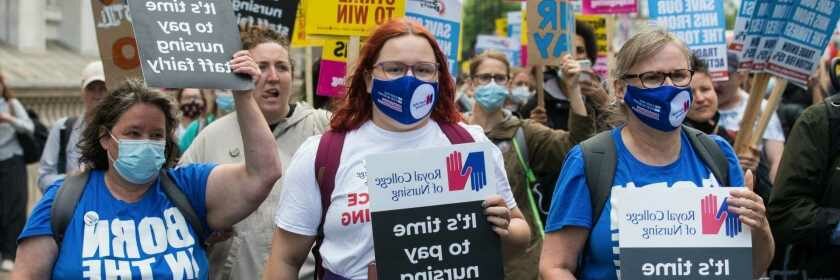“We’ve got to the point where enough is enough”: why nurses are going on strike

Written by Lauren Geall
As Stylist’s digital writer, Lauren Geall writes on topics including mental health, wellbeing and women’s issues. She’s also a big fan of houseplants and likes to dabble in film and TV from time-to-time. You can find her on Twitter at @laurenjanegeall.
As nurses across England, Wales and Northern Ireland prepare to go on strike on Thursday (15 December), Stylist speaks to one nurse about why she’s taking action.
Later this week, nurses across England, Wales and Northern Ireland will go on strike for the first time in the Royal College of Nursing’s (RCN) 106-year history. On the 15 and 20 December, up to 100,000 nursing staff from across the three nations will take action after members voted to reject the £1,400 pay rise offered to them by the government.
But when it comes to the factors which have led to this strike, pay is just the tip of the iceberg. For years, the nursing sector has struggled with staffing shortages, with the Covid-19 pandemic and under-inflation pay increases making it harder to recruit and retain staff. For example, in September this year there were 47,496 NHS nursing vacancies – an almost 10,000 increase on the year before, when that figure was 39,931.
While agency staff are often used to cover these shortages, data shows the lack of permanent staff is still having an impact; a survey of UK nurses carried out earlier this year by the RCN revealed that 8 in 10 nurses said there weren’t enough nursing staff to meet all patient needs safely on their last shift.
Lyndsay Thomson, 33, who works as an anaesthetic nurse in Bangor, Northern Ireland, knows this reality all too well. On top of struggling with staff shortages, she says her department has been struggling to retain staff with an appropriate ‘skill mix’ in order to cover all the areas necessary for the department to function, provoking concerns about patient safety.
As someone who has worked in nursing for over a decade, Thomson is sympathetic to the public’s concerns about the impact the strikes will have, but believes they’re the only way to get politicians to listen to the real concerns of nurses up and down the country. Here, she explains more about why she’s choosing to take action this Thursday – and how you can show your support to the strikers on and off the picket line.
“It infuriates me that our politicians are not listening and we’ve got to the point where this is our only option. But this is not just about pay, although pay is a massive factor.
“As nurses we are degree-level professionals and we are not paid in keeping with that and the responsibilities we have. Over the last couple of years those responsibilities have increased – we are taking on more and more responsibilities that would have previously fallen to our medical professional colleagues. So not being recognised financially is a big drive. But my biggest drive is because of my concerns over patient safety.
“As nurses, we have done everything we possibly can over the last 10 to 15 years to raise our concerns about patient safety, and we’ve now got to the point where enough is enough.
“At this point, patient safety is being compromised day in, day out in every department, whether that be wards, the emergency department, the community or theatres. Patient safety is being compromised because we don’t have safe and effective care staff numbers and skill mix.
“We have escalated our concerns at every level – this is not something that has happened overnight, we’ve had years of austerity. We are just fed up that our politicians don’t listen to us, and that they’re having to rely on overseas recruitment because they cannot recruit and retain enough of our own nurses.
“Of course, while the RCN members have voted for strike action, Pat [Cullen] our general secretary and chief executive has made it very, very clear that these strike actions could be suspended if the government agreed to enter formal negotiations. Their unwillingness to do that, to me, displays their absolute disregard for the nursing profession. In fact, it infuriates me.
“Our politicians have the power to stop the strike action by simply entering into formal negotiations with Pat and the RCN. And their refusal to do that angers me more than anything.
“During the pandemic we had people clapping at their doors, and it meant so much to us knowing that we had that public support. So while I’m not asking people to clap at their doors again, it would be nice to see people sharing their support whether that’s on social media or in person, either tooting their horn as they drive past us on the picket line or joining us there.
“They can also lobby your own MPs and local politicians as well – it would just mean so much if people could support us in any way they can.”
In a statement, a spokesperson for the Northern Ireland Department of Health said: “The Department of Health shares the frustration of Northern Ireland health care staff at the absence to date of a pay award for this year. We greatly value our healthcare staff and very much regret that so many of them believe industrial action is necessary.
“Northern Ireland’s health and social care system is planning for a very difficult winter period.
“In respect of strike action, the Department and Health and Social Care Trusts will work closely with trade unions with a view to protecting critical services as much as possible. However, there will inevitably be an impact on patient care, and further impairment of already highly pressurised services.”
Image: Getty
Source: Read Full Article